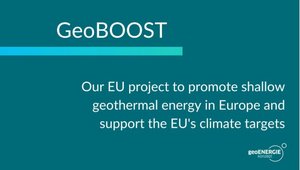GeoBOOST - Boosting geothermal heat pumps to mainstream cost-effective and efficient renewable heating and cooling in buildings
The Fit for 55 Package, which outlined policy measures to deliver the EU Green Deal, calls for a greater than 40% target for renewable energy sources by 2030 in the Renewable Energy Directive (RED). It also calls for an increased primary (39%) and final (36%) energy savings to be achieved by the Energy Efficiency Directive (EED). Accelerating the penetration of cost-effective and energy efficient renewable heating and cooling (RES HC) technologies will be key to the successful achievement of these targets. However, RES HC is hampered by ineffective policy measures, institutional barriers, stop-and-go financial support schemes and incumbent power which has designed markets around fossil fuel utilisation rather than capital intensive RES HC solutions. These blockages were identified as early as 2005 by the K4 RES-H Altener IEE project in 2005. They were reconfirmed by the FRONT IEE project in 2016. Therefore, it is of the upmost urgency to unlock historic barriers to the mass deployment of RES HC solutions. This is the genesis of the GeoBOOST project. The RED and EED adopted in 2019 is proposing new measures on RES HC, and the updated version REDIII and EED from 2021 reinforces some of these provisions to mainstream renewable energy in heating and cooling. The project will support the implementation of the Renewable Energy Directive and the Energy Efficiency Directive in the EU, by allowing a market uptake of geothermal heating and cooling technologies. GeoBOOST will seek to unlock market barriers for geothermal heat pumps, as they are the most energy efficiency and cost-effective RES HC solution but have often been neglected by policy makers and also by the dedicated market uptake research proposals.
Partners
EGEC, the European Geothermal Energy Council; UPV Universitat Politècnica de València; geoENERGIE Konzept: Startseite; Technische Universität München (TUM); TERRA GEOSERV LIMITED; Rototec AB; Geologische Bundesanstalt; Groenholland - Geo Energy Systems; Polska Organizacja Rozwoju Technologii Pomp Ciepła


